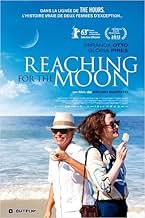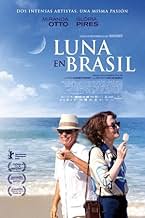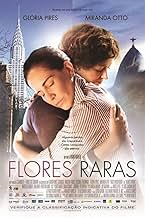AVALIAÇÃO DA IMDb
7,0/10
3,6 mil
SUA AVALIAÇÃO
Crônica da trágica história de amor entre a poeta americana Elizabeth Bishop e a arquiteta brasileira Lota de Macedo Soares.Crônica da trágica história de amor entre a poeta americana Elizabeth Bishop e a arquiteta brasileira Lota de Macedo Soares.Crônica da trágica história de amor entre a poeta americana Elizabeth Bishop e a arquiteta brasileira Lota de Macedo Soares.
- Prêmios
- 9 vitórias e 21 indicações no total
Enredo
Você sabia?
- CuriosidadesFour paragraphs appear between the end of the film and the beginning of the credits.
1. "Few women write major poetry. Only four stand with our best men: Emily Dickinson, Marianne Moore, Elizabeth Bishop and Sylvia Plath." - Robert Lowell
2. "I'd rather be called the 'The 16th Poet' with no reference to my sex, than one of 4 women - even if the other three are pretty good." - Elizabeth Bishop
3. Elizabeth Bishop died in 1979 in the United States. She is considered on the most important poets of the English language.
4. In 2012, UNESCO declared the city of Rio De Janeiro a World Heritage site. The Flamengo Park is one of its main attractions.
- Erros de gravaçãoOpening in 1951 but Bobby Vinton singing Blue Velvet was not until 1963.
- Citações
Elizabeth Bishop: It's OK. I'm not drunk. I'm just crying in English.
- Cenas durante ou pós-créditosNine of the main performers (the first 10) are listed in the credits without the name of their character. Only Treat Williams is credited as his character, Robert Lowell.
- ConexõesReferenced in Programa do Jô: Episode dated 26 August 2013 (2013)
Avaliação em destaque
After the famous poet, Elizabeth Bishop, is greatly mentored by the star poet Robert Lowell, she, travels to Brazil, on her inheritance, has a love affair with a wealthy, female architect, who is in another love relationship with a former fellow student of Bishop's at Vassar College, called Mary. This threesome love relationship fails because each person involved in this relationship has a main flaw. Bishop's flaw is alcoholism. The architect's flaw is that she works herself to the point of mental insanity. Mary's flaw is jealousy. She does not want to share her architect girlfriend with Elizabeth Bishop, understandably.
When watching the film in the cinema, yesterday, with the oranges and the red wine, I bought at the booth, all of us clapped at the end of the film, with wonderful actors, very beautiful scenery of Brazil as well as fantastic architecture, before tortillas, guacamole, nachos, corona and other Latin American snacks that were cheaply sold outside.
This positive account begs the question, why I did not rate that film to be so good. Like many art-house or like many artsy films, Reaching for the Moon, we hardly know who most of the characters in this film truly are. There is just not enough character development in the film. We do not know what exactly makes Miss Bishop travel, why she loves this architect, why the architect loves her and why Mary loves this architect. We also do not know their views about belonging to a sexual minority. We do not know the reason for their flaws, such as the traumatic experiences that made Miss Bishop an alcoholic, what made the architect a workaholic, who does not talk to her family, and we know almost nothing about this third girl Mary, except that she went to University with Miss Bishop.
We do not know the exact cause or even the nature of the architect's insanity. When she kills herself, she leaves no note, and nobody even asks or tries to find out why the hell she did it or if it was an accident.
Like most films about poetry little attention is paid to the kind of Poetry Miss Bishop wrote, so that when she wins the National Book Award and the Pulitzer Prize, in the film, you still end up leaving the movie theatre wondering why her poetry was considered to be so special, apart from the fact that she was rich, well educated and knew some of the greatest poets like Robert Lowell and Marian Moore.
This film is full of paper Mache' characters, in which you hardly know who the people in the film are, despite the strong attempts of the actors in the film to act as well as possible, which made the film worth watching, especially as a poet and author myself, amongst other things.
When watching the film in the cinema, yesterday, with the oranges and the red wine, I bought at the booth, all of us clapped at the end of the film, with wonderful actors, very beautiful scenery of Brazil as well as fantastic architecture, before tortillas, guacamole, nachos, corona and other Latin American snacks that were cheaply sold outside.
This positive account begs the question, why I did not rate that film to be so good. Like many art-house or like many artsy films, Reaching for the Moon, we hardly know who most of the characters in this film truly are. There is just not enough character development in the film. We do not know what exactly makes Miss Bishop travel, why she loves this architect, why the architect loves her and why Mary loves this architect. We also do not know their views about belonging to a sexual minority. We do not know the reason for their flaws, such as the traumatic experiences that made Miss Bishop an alcoholic, what made the architect a workaholic, who does not talk to her family, and we know almost nothing about this third girl Mary, except that she went to University with Miss Bishop.
We do not know the exact cause or even the nature of the architect's insanity. When she kills herself, she leaves no note, and nobody even asks or tries to find out why the hell she did it or if it was an accident.
Like most films about poetry little attention is paid to the kind of Poetry Miss Bishop wrote, so that when she wins the National Book Award and the Pulitzer Prize, in the film, you still end up leaving the movie theatre wondering why her poetry was considered to be so special, apart from the fact that she was rich, well educated and knew some of the greatest poets like Robert Lowell and Marian Moore.
This film is full of paper Mache' characters, in which you hardly know who the people in the film are, despite the strong attempts of the actors in the film to act as well as possible, which made the film worth watching, especially as a poet and author myself, amongst other things.
- mwathieric
- 10 de abr. de 2014
- Link permanente
Principais escolhas
Faça login para avaliar e ver a lista de recomendações personalizadas
- How long is Reaching for the Moon?Fornecido pela Alexa
Detalhes
- Data de lançamento
- País de origem
- Centrais de atendimento oficiais
- Idiomas
- Também conhecido como
- Você Nunca Disse Eu Te Amo
- Locações de filme
- Empresas de produção
- Consulte mais créditos da empresa na IMDbPro
Bilheteria
- Faturamento bruto nos EUA e Canadá
- US$ 45.502
- Fim de semana de estreia nos EUA e Canadá
- US$ 14.573
- 10 de nov. de 2013
- Faturamento bruto mundial
- US$ 1.534.391
- Tempo de duração1 hora 58 minutos
- Cor
- Proporção
- 1.85 : 1
Contribua para esta página
Sugerir uma alteração ou adicionar conteúdo ausente

Principal brecha
By what name was Flores Raras (2013) officially released in India in English?
Responda

























